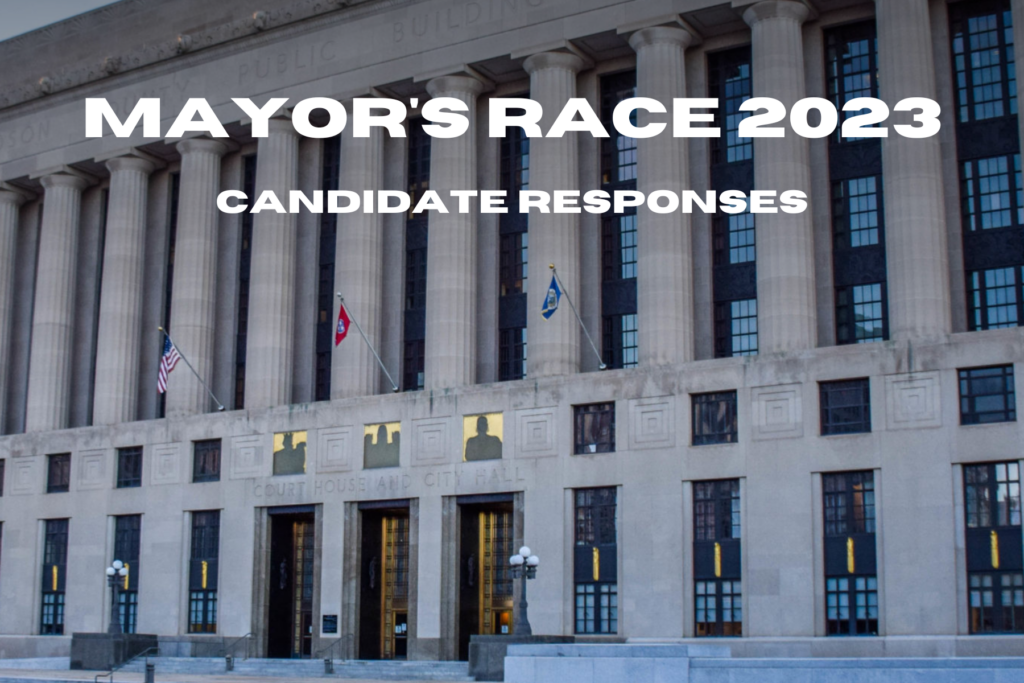
Early balloting opens July 14, as Nashville voters head to the polls to elect the city’s next mayor. Choices are far from limited — with a field that rounds out to 12 candidates.
WPLN News solicited questions from our audience on the issues they are most concerned about. We’ve selected five that we presented to all candidates — on the topics of gun violence, affordable housing, public transportation, the environment and relations with the Tennessee General Assembly.
During the last legislative session, Tennessee’s General Assembly unleashed a slew of bills restricting Nashville’s right to self-governance. As lawmakers abolished community oversight boards, attempted to slash the size of Metro Council, and transferred the power of local boards to the state, the relationship between the Republican-led state government and left-leaning Nashville has deteriorated.
One WPLN listener wondered how Nashville’s mayoral candidates would approach the state’s targeted efforts. They asked:
What are you going to do to keep Nashville shielded from the partisan bullying of state lawmakers?
Many candidates criticized the actions of the state during the last legislative session, reiterating the importance of putting the needs of Nashvillians at the forefront of the work. Some touted their abilities to work across the aisle, encouraging collaboration between city and state leaders. Others suggested creating stronger relationships with neighboring mayors across the region.
Below are answers provided by the 10 candidates who wrote in response to WPLN News. Candidates were asked to limit their responses to around 200 words and are published in full. Responses are organized alphabetically.
 Courtesy Natisha Brooks
Courtesy Natisha Brooks Natisha Brooks
Brooks is a former educator who operated a home school academy. She ran for congressional seats in Republican primaries in 2020 and 2022 and is a self-described “Christian conservative constitutionalist.” She says:
Be the peacemaker between the two of us will be the position taken by the Brooks’ administration. The Brooks’ administration will present to the state what is working well with Nashville government such as the BNA Airport and be the great communicator for the needs of our county such as higher teacher pay and police pay for better instructors and security of our city. Mental health clinics will be the top priority along with better adoption/foster care services between Davidson County and the state.
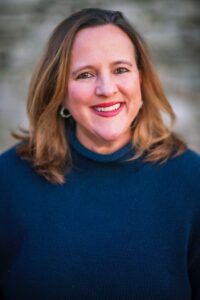 Courtesy Senator Heidi Campbell Facebook
Courtesy Senator Heidi Campbell FacebookHeidi Campbell
Campbell currently represents Tennessee’s 20th district in the state Senate. Earlier this year, she ran for the U.S. House of Representatives in the race for Tennessee’s recently redistricted 5th congressional district. She previously served as the mayor of Oak Hill, a small town in Davidson County that maintains its own municipal government. She says:
The amount of control that the ideologically motivated Tennessee State Legislature and the governor want to assert over our municipal autonomy threatens real harm to our city. Attempting to halve the size of our Metro Council and change the way they vote, take control of our Metropolitan Airport Authority, Sports and Convention Authority, eliminate the Community Oversight Board, restrict tax revenue collection — undermines both the trust and confidence we can have in our state government, and the political accountability for decisions these bodies make that affect the general public. As your mayor, I will employ a rigorous and consistent communication program to keep citizens informed. Being loud is a tactic itself — and while it can’t solve everything, I will employ the authority of my office for as much as it’s worth. Unfortunately, Republican supermajorities in both chambers of the legislature virtually guarantee that state overreach into Nashville’s affairs will persist as long as they underestimate the damage they’re doing and feel as though they may benefit politically from their irresponsible actions. As your mayor I’ll sound the alarm and join forces with other elected officials in the region to push back on unnecessary overreach into our affairs through whatever legal tools necessary. As a state senator I’ve built working relationships across the state, and across the aisle, and I will look for ways to work constructively with our partners in the state government.
 Courtesy Jim for Nashville Facebook
Courtesy Jim for Nashville FacebookJim Gingrich
Gingrich, the former Chief Operating Officer of Wall Street firm AllianceBernstein, retired to his post in 2020. He is not originally from Tennessee, but was part of the team who worked to move the asset management company’s headquarters to Nashville in 2018. He says:
What is happening right now with the state has all of us asking “where is the adult in the room?” Rather than focus on what is best for the people they serve, we have politicians seeking to score political points. I am not a career politician, and I will not play these games. But our relationship with the state requires a strategy that extends beyond strengthening our relationship with the governor and legislative leadership. The Nashville mayor is the natural convener across the state, and we can build coalitions to aid in our debates with the state. For instance, the greater Nashville region accounted for 50% of the economic growth of the state over the past 10 years, and all of our surrounding counties and towns are part of that ecosystem. As mayor, I will invest my time building productive relationships with our neighbors. We also share common challenges with all of the other major cities across the state, be it affordable housing, crime or education. Let’s stop playing politics and get back to solving problems.
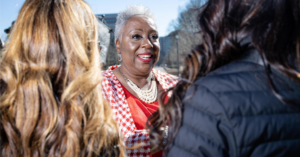 Courtesy Sharon Hurt campaign
Courtesy Sharon Hurt campaign Sharon Hurt
At-large Councilmember Sharon Hurt has served on the Metro Council since 2015. She worked with nonprofit Jefferson Street United Merchants Partnerships for 23 years, stepping down from her role as president and CEO in 2021. She says:
As a long-time Councilmember At-large, I am not unfamiliar to being an outlier in Tennessee’s political arena. When the RNC wanted to come to Nashville, I was the sole sponsor in opposition of this move. The key to achieving meaningful progress while remaining a political outlier is strong and firm communication. The first thing I will do to that end is meet with Speaker Sexton and establish that I am not someone to ignore. I bring a different approach to my communication that can be disarming and uncommon in Tennessee politics. I’m a fighter for the people, and they’re not used to my approach. If that doesn’t work, I believe that currently the state’s involvement in the city is an overreach of state power, and for me, non-enforcement of certain state laws is a critical tool to fight this overreach. When we can easily find consensus with the state government, I will gladly cooperate, as I have in the past by passing health and safety grants from the state. However, the Tennessee General Assembly has shown, in recent months, that it is willing to attack Nashville and its people. As mayor, I will always fight back.
 Courtesy Stephanie Johnson campaign
Courtesy Stephanie Johnson campaign Stephanie Johnson
Johnson is the creative director of a skincare company and has also served in the Americorps Vista program and the Nashville Mayor’s Youth Summit Council. In 2019, she ran for the District 7 Metro Council seat. She says:
For state relations, we need an organized system where our state policy team (will be newly created) works on the hill, interfering with bills coming down the pipeline and organizing citizens to dismantle them before they even hit the news. That is the type of work I will bring to Metro. It’s time to stop playing defense and go on the offense. Our role as Metro government is to advocate for our citizens’ needs, and we will work to ensure we break down laws and change those that seek to hurt our citizens.
 Courtesy Freddie O'Connell
Courtesy Freddie O'Connell Freddie O’Connell
Councilmember Freddie O’Connell
Metro Councilmember and software architect O’Connell has represented District 19 since 2015. Before that, he chaired Metro Transit Authority’s board and led the Salemtown Neighbors Neighborhood Association and served on various other boards and committees. He says:
Cities like ours are the economic engines of the state. It is our people — and our policies — that bring in the money that state legislators use to improve their far-away counties and to fund state-based programs. So, I will revisit the relationship between Metro Nashville and the state government, but it needs to come from a place where Nashville understands our value, knows our points of leverage, and asserts our power. I’ve been deeply effective in local government and yet I know that the state might create obstacles and constraints, and I think that’s the experience we need a mayor to have. I also think that there is a fundamental difference between the public policy perspective that I offer and the performative politics of others. We need a mayor who is willing to put in the work on projects that matter, outside of the spotlight of the press and social media, and build real offline relationships with the governor, leadership, and committee chairs. I also expect to reinvest in regional relationships with city and county mayors as well as other big city mayors and work with organizations like We Decide Tennessee to help our county delegation to the General Assembly and state legislators know Nashville doesn’t stand alone. Fundamentally, though, the most important thing a mayor can do for Nashvillians is use the power of the mayor’s office to focus our energy and resources on a Nashville for Nashvillians rather than toys for tourists the state wants.
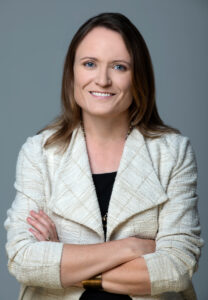 Shannon Fontaine Courtesy Alice Rolli campaign
Shannon Fontaine Courtesy Alice Rolli campaignAlice Rolli
Alice Rolli
Rolli served as campaign manager for Tennessee Republican Sen. Lamar Alexander during his 2014 reelection bid. She also worked in the Tennessee Department of Economic and Community Development under Gov. Bill Haslam. She says:
I believe it possible to love both Nashville and Tennessee — and our residents benefit when we work together. The highest point in the county is named for my great-grandfather — Ganier Ridge at Radnor Lake. Residents nearby don’t care that it is a state park — they are glad that our city leaders worked with the state and today we have a park instead of 300 houses on that land. In this, my approach is decidedly different from the rest of the field. As of a few weeks ago I was the only candidate who’d been to meet with our fast-growing neighboring mayors. And we share challenges — around our inability to charge impact fees to capture the cost of growth at the site of growth — and I believe we’ll get more done to change that state law when we work together to bring solutions that benefit us all. Also, we’ve got to get our city’s priorities in order: we are dead last in the state for high school preparedness and we devote more of our city’s budget to our debt payments than the entire state of Tennessee, combined. Managing our city well — and working with the state — will ultimately benefit our residents.
 Courtesy Metro Nashville Government
Courtesy Metro Nashville Government Vivian Wilhoite
Wilhoite formerly served on the Metro Council, representing District 29 from 2003-2011. In 2016, she was elected as the Davidson County Property Assessor Race, and was re-elected in 2020. She says:
I believe as mayor we must have a hard reset with our state leaders. We have more in common than we may think, and certainly Nashville’s success is Tennessee’s success. I would immediately meet with both speakers and our governor and work to turn the page to one of cooperation, mutual respect and understanding, and find win-win solutions for Nashville and Davidson County. Of course, where necessary, we will fight against those issues that do not put people first.
 Courtesy Matt Wiltshire
Courtesy Matt Wiltshire Matt Wiltshire
Wiltshire previously worked for the Metropolitan Development and Housing Agency. He says:
The relationship right now is fundamentally broken and the next mayor has got to fix it. I have a proven track record of building constructive relationships across the political aisle and across levels of government, and I already have invested in repairing our broken relationship with the state. Now, don’t get me wrong — there are a few things the legislature has done that have absolutely enraged me. But nobody is going to be better off if we throw up our hands and don’t talk to one another. When I served as director of ECD and when I worked at the Housing Authority I worked closely with counterparts at state ECD and State Housing Authority — those folks were often times from a different political party than me, but we found common ground that was rooted in a relationship and a baseline of trust. I’ll take a similar approach as mayor. Now, I want to be very clear. Building a relationship does not mean we won’t disagree. In fact — I believe when we build a relationship we can stand up for our principles even more strongly. And if the legislature continues to attack Nashville or Nashvillians in future sessions, I’m going to be the first to push back.
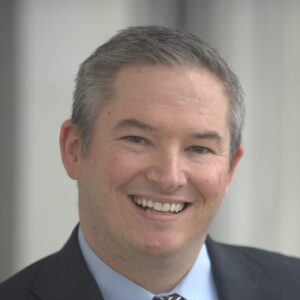 Courtesy Jeff Yarbro campaign
Courtesy Jeff Yarbro campaign Jeff Yarbro
Yarbro has served as a Democratic state senator since 2014, representing District 21. He spent four years as the Senate minority leader, and also works as an attorney at Bass, Berry & Sims law firm. He says:
The ongoing conflicts between Nashville’s Metropolitan government and the Tennessee General Assembly are unsustainable. It’s crucial for the next mayor to prioritize the city’s autonomy and develop a strategy to prevent and navigate conflicts. This strategy should include consistent communication with state leaders, developing solutions, and forging coalitions within Nashville and across the state. By working together to actively lobby against laws that negatively impact Nashville, we can build a brighter future for all residents. Regardless of what laws and policies are enacted at the state level, the next mayor must bring the full resources of the city to bear to ensure Nashville is a genuinely welcoming community where all of our residents feel safe, secure and supported.

